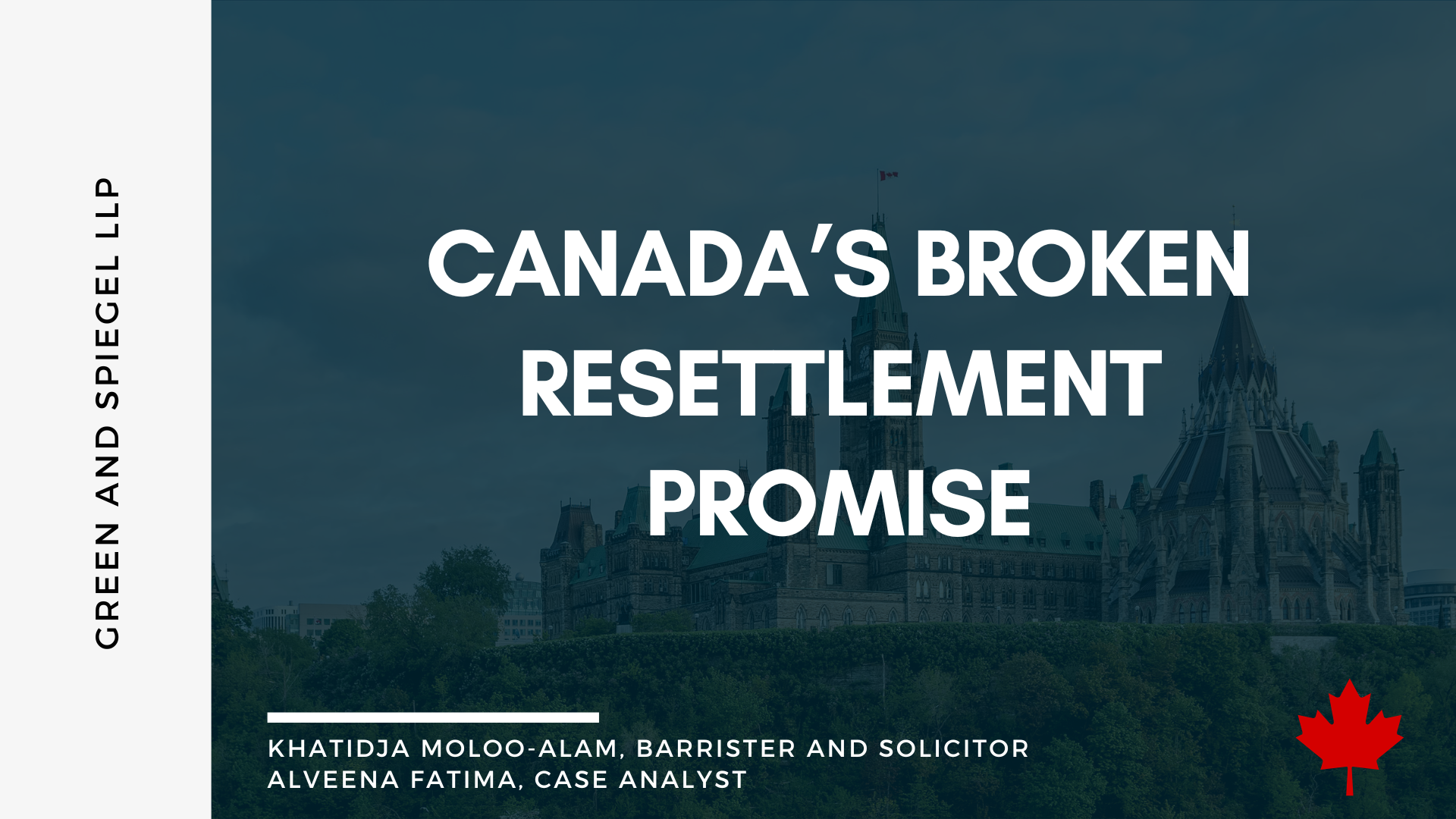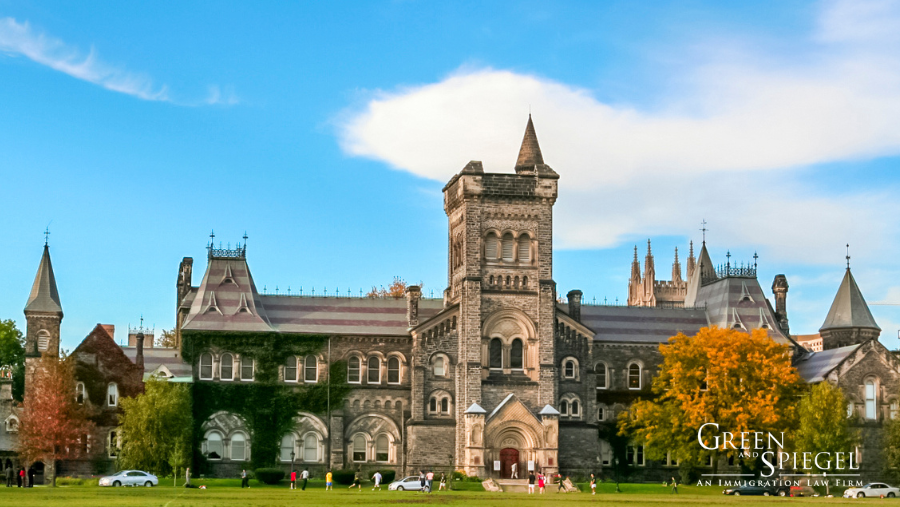
2021 brought about a terrifying change in Afghanistan – the Taliban took over the government. 2022 brought about a terrifying change in the Ukraine – Russia invaded a sovereign nation and demanded that the Ukraine act to placate their demands.
Canada attempted to take action on both fronts, but one of the schemes has been much more effective than the other and the clear difference between the two schemes needs to be recognized and criticized.
In August 2021, the Government of Canada announced its commitment to resettling 40,000 Afghan refugees through several special measures and programs. The government committed to delivering its promise through the implementation of the following four special programs.
- Special Immigration Measures Program for Afghan nationals (and their families) who assisted the Government of Canada.
- To be eligible to apply under this category, applicants must meet the following requirements:
- be an Afghan national whose employment involved a significant and/or enduring relationship with the Government of Canada (Could include interpreters who worked with the Canadian Armed Forces and local staff who currently or used to work at the Embassy of Canada to Afghanistan).
- applicant or eligible family members were in Afghanistan on or after July 22, 2021
- not be inadmissible to Canada
- Under this program, those who meet the eligibility requirements, must submit a web form to express their interest to apply. They must then wait for the government to contact them.
- To be eligible to apply under this category, applicants must meet the following requirements:
In order to apply, the applicant must simply submit an online web form under the category “Situation in Afghanistan” and include their personal details, identity documents, and documents serving as proof that they worked with the Government of Canada. Many Afghan nationals who served as interpreters for the Canadian Armed Forces have applied, yet they are still waiting in Afghanistan for periods of time extending more than a year, the same country they seek refuge from. Meanwhile the Taliban continue to run the country and as the Western world has designated the Taliban government as terrorists, the economy has no money to pay salaries or buy food.
Our firm has received several enquiries for the past few months, with jarring subject lines such as “Please help me and my family”, “I still don’t have my G number after two years”, “I am not safe”, “the Taliban have burned my house, please help”. However, apart from submitting a request for an update through the web form, we are not able to provide them with any other assurance. Not only is the method of applying in stark contrast to the measures set out for Ukrainian nationals – who are eligible to apply for visitor visas, work permits and study permits through the IRCC portal – but they are also not given any estimated timeline on when to expect a response, let alone confirmation that their applications have been received.
- Special humanitarian program focused on resettling vulnerable Afghans
- To be eligible to apply under this category, applicants must meet the following requirements:
- be an Afghan national who is outside of Afghanistan
- don’t have a durable solution in a third country and
- be a part of one of these groups: women leaders, human rights defenders, persecuted religious or ethnic minorities, LGBTI individuals, and journalists and those who helped Canadian journalists.
- Those who meet the eligibility requirements for this program should register for refugee status with either the United Nations Refugee Agency (UNHCR) or the government of the country in which they now live.
- To be eligible to apply under this category, applicants must meet the following requirements:
Afghan nationals who have been able to escape to Pakistan and register with the UNHCR are not in a favorable situation. The UNHCR is overrun with people and is not processing requests quickly enough. After speaking with an UNHCR representative from Islamabad through their hotline, we learned that the processing delay is a result of the restrictions and lack of policies set in place by the Pakistani government with regards to the influx of Afghan refugees. We were informed the UNHCR has to wait for a “go” from the Government of Pakistan to process the UNHCR status of the refugee claimants.
The processing delay is resulting in the visitor visas issued by Pakistan to Afghan refugees, to expire. With Pakistan’s recent announcement that it will not renew the visa’s of Afghan refugees, the Afghan nationals in Pakistan are finding themselves without status.
Now, Pakistani authorities are going door to door looking for those whose visas have expired, despite receiving a slip from the UNHCR with their assigned case number, and upon discovery, the Afghan nationals are being deported back to Afghanistan via bus, where they are greeted by the Taliban.
What does that reality look like? No one knows because those who have been deported (most recently a bus filled with 500 women and children), are not able to contact those they left behind in Pakistan.
Is Canada aware that their delay in assistance to Afghan refugees in Pakistan together with Pakistan’s refusal to renew visitor visas and process their UNHCR status will cause a further humanitarian crisis than is already occurring? Moreover, why is the same requirement of obtaining UNHCR status not in place for Ukrainian nationals?
- Pathway to permanent residence for extended family members of former interpreters.
- To be eligible to apply under this category, applicants must meet the following requirements:
- be an Afghan national who is outside of Canada and was in Afghanistan on or after July 22, 2021
- The Afghan family member, the former interpreter, worked for the Government of Canada or the Canadian Armed Forces and immigrated to Canada under the 2009 and 2012 public policies – i.e., Special immigration measures for local staff in Kandahar who support Canada’s mission in Kandahar Province, Afghanistan as of October 9th, 2009, and Temporary public policy concerning certain local staff who provided direct support to the Canadian mission in Kandahar as of February 2012.
- Fall under the listed category of family members
- Provided a complete and signed declaration from the Afghan family member who immigrated to Canada under the 2009 or 2019 public policies.
- Applicant and family member coming with them have a valid passport or travel document or a valid identity document or statutory declaration.
- Those who meet the eligibility requirements for this program, must fill out the applicable application forms, available on the IRCC website, and mail their applications to the Centralized Intake Office – EFPP – Afghanistan in Canada.
- To be eligible to apply under this category, applicants must meet the following requirements:
Again, those who escaped to Pakistan now either have to live in hiding for fear of deportation, or escape to another country.
Those who applied for this PR pathway are still waiting for a response from Canada, even after initially applying in 2018 – more than four years ago. Our firm has submitted several requests via the online web form requesting an update or simply submitting an application for these Afghan nationals, however, the applications seem to be submitted into a black hole without a response or confirmation of receipt. Whereas the applications submitted on behalf of Ukrainian nationals display updates of processing and we receive quick responses to requests for updates.
The obvious difference in treatment between Afghan and Ukrainian displaced persons is very concerning. Canada attempts to present as a place for equal opportunity immigration but two tiered schemes seem to show the reality of policy making.
- Special program to sponsor Afghan refugees without refugee status from the UNCHR or a foreign state
- Under this program, groups of five sponsors and community sponsors who are eligible to be a sponsor can sponsor an Afghan refugee who is outside of Afghanistan and who meets the definition of Convention Refugee or Country of Asylum Refugee.
- There are two different Instructions Guides and application processes on the IRCC website, depending on the specific category of sponsor.
As of October 19, 2022, only 22,915 Afghan refugees have arrived in Canada under the above-listed streams.
The approach to resettling Afghan refugees under these streams has been the subject of criticism as most of these programs require that applicants be outside of Afghanistan at the of the application. Some believe that the Program for Afghan nationals who assisted the Government of Canada provides better chances of evacuation than the other three programs since, under this category, Afghan nationals can apply from inside Afghanistan. However, according to an IRCC report, the government of Canada has received 16,135 applications under this stream, 10,970 of which have been approved and, of those approved applications, only 8,305 Afghans have arrived in Canada. The rest remain in a third country or Afghanistan.
During the past few months, our office has been contacted by over 700 Afghan nationals in and outside of Afghanistan who have either submitted their applications under the Program for Afghan nationals who assisted the Government of Canada but have not received any helpful communications from the IRCC concerning their applications, or are in hiding in Pakistan, waiting desperately for their UNHCR status.
The applicants, who once served the Government of Canada in Afghanistan, are witnessing their loved ones being killed. In their emails, they have expressed fear for their lives and have indicated that they are being tortured and are being subjected to inhumane treatment by the Taliban.
Another difference in the measures for refugees from Afghanistan versus Ukraine is the biometric requirement. The biometric requirement set by the Canadian government is one of the many barriers to bringing Afghan refugees to Canada. This barrier is especially problematic for Afghan refugees who are still stranded in Afghanistan. With the Taliban having control of Afghanistan’s government, refugees who are inside Afghanistan must travel to neighbouring countries to complete their biometrics, an almost impossible task given the numerous Taliban checkpoints. However, while there seems to be an obvious solution to the issue of biometrics, namely, that Afghan refugees complete their biometrics inside Canada, the government has refused to provide any meaningful answer as to why they are not adopting this solution.
Interestingly, governments have adopted more creative and generous measures for Ukrainian refugees. With respect to biometrics, the UK has introduced a program where Ukrainian refugees are given the option of completing their biometrics once they land in the UK. While it is true that accessing safe passage from a territory that is controlled by the Taliban is an issue in Afghanistan, it is not clear why Afghan refugees can’t complete their biometrics after arriving in Canada. Other stark differences in Canada’s response to the crisis in Afghanistan and Ukraine raises the question – why are these refugees are being treated differently.
For example, while Canada promised to resettle 40,000 Afghan refugees, it promised to welcome an “unlimited” number of Ukrainian refugees. When asked about the difference between the two programs, the Minister of Immigration, Refugees and Citizenship Canada stated that they are trying something new for Ukrainian refugees. The Minister also stated that the logistics on the grounds are very different, making the completion of biometrics very challenging for the Afghan refugees. When asked why Canada could not allow Afghan refugees to complete their biometrics inside Canada, the Minister referred to the need for a “robust security screening process” without further explanation.
#UKRAINE2022, the keyword that applicants are advised to use when using the crisis web form designed for Ukrainian nationals requesting updates on their applications. As such we must ask, where is the #AFGHANISTAN2021 code which would ensure faster processing for the thousands of Afghan nationals seeking refuge?
For further information, please contact us.





